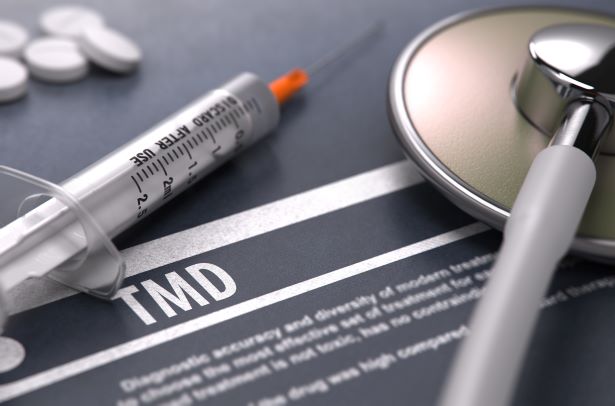Damage to the TMJ ligaments and disc results in joint sounds in most people. Clicking, popping, or grinding noises in the jaw joints (TMJ) indicates that ligaments have torn and the cartilage “disc” is being damaged and isn’t protecting the condyle. Eventually the popping and clicking “goes away” when the joint is rubbing “bone on bone” in a simple explanation.
As soon as the TMJ begins to make noise, the articular bone may start to react in one of 2 ways; the bone may develop osteoarthritis (bony spurs/thickening) as it wears down. If an inflammatory arthritis develops because the pressure is too great within the joint, the bone can rapidly disintegrate. This shows up clinically as pain in a TMJ, clicking/popping, an uneven bite, etc.
Treating TMJ with orthopedic orthotic devices (NOTR bite guards, night guards, or anterior appliances) is a critical 1st step after a thorough exam, imaging, and diagnosis. As in most orthopedic problems, placing the TMJ under a gentle but constant traction will decreases joint pressure, helps stop bone damage, and relaxes the jaw muscles.
In some cases, I utilize tetracycline antibiotics to help stabilize bone as the pressure is being relieved by oral orthotics. We can utilize some properties of the tetracycline antibiotics to help slow the bone destructive pathways as the joint pressure is being reduced with proper orthotics; similar to the effect in periodontal disease with “Periostat” after careful debridement to protect bone loss.
Doxycycline, at low doses[1] (sub-antibiotic dose) interferes with “bone resorption” pathways and can help the TMJ maintain bone and perhaps regenerate some areas that are being affected. If we catch the early signs of bone destruction in the TMJ, it’s often an effective adjunct to orthotic therapy early in treatment. I have found it especially useful in teenage patients whose bone has not reached maturity while being treated with decompression orthotics for TMJ, if this condition exists.
However, the most important thing to remember in treating TMJ conditions is that the TMJ (jaw joint/condyle) is almost 100% of the time in a posterior, compressed position when the teeth are together. This underlying, orthopedic imbalance is the root cause of almost all TMJ pathologies: clicking and popping, joint pain, limited movement, and muscle pain in the head and neck.
Use of low dose tetracycline after using an orthopedic orthotic that objectively decompresses the TMJ can be a useful adjunct to help reverse degenerative TMJ conditions.
[1] The Anti-inflammatory Properties of Tetracyclines, Weinberg, JM. Cutis. 2005 Apr;75(suppl): 6-11




